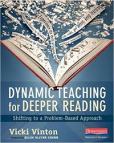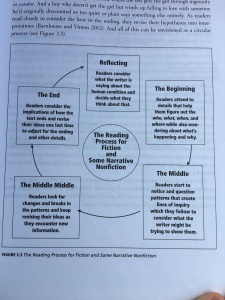 So, I’m participating in the #cyberpd community for the first time evah! The opportunity to read, reflect and share with a group of like-minded, or maybe not-so-like-minded educators is an exciting one, and forces me out of my summer bubble. I get the chance to do some professional development from the comfort of my front porch. For anyone reading this blog post who is not part of the #cyberpd community, you can find more information here. Come join us, it’s probably not too late.
So, I’m participating in the #cyberpd community for the first time evah! The opportunity to read, reflect and share with a group of like-minded, or maybe not-so-like-minded educators is an exciting one, and forces me out of my summer bubble. I get the chance to do some professional development from the comfort of my front porch. For anyone reading this blog post who is not part of the #cyberpd community, you can find more information here. Come join us, it’s probably not too late.
So, away we go….
There is much to explore in this book. So many ideas that make me want to shout “Amen!” and throw my fist in the air. And there are some that have less meaning, or power, for me because of the position I’m in, or maybe the kind of school I work at. As a K-8 school librarian, my focus is always on getting the right book into the hands of the right kid. To encourage them to read widely; to graze on all kinds of books and then to dig deep into the ones that speak to them. Mostly, I want them to love to read. I am not a reading teacher, or literacy specialist, but I work closely with my colleagues who are, to try and help them find new and interesting, or new and exciting, or new and literary books into their hands, as well. I am constantly encouraging teachers to read children’s literature, to read what the kids are reading and to find ways to incorporate those books into their curriculum.
When I hear students groan about how much they hated reading Tuck Everlasting in class, my heart breaks a little. When they roll their eyes at In the Year of the Boar and Jackie Robinson, I cringe. I always wonder how they would respond if they had to read and answer text questions for The Lightning Thief or Harry Potter. Would they still love it? Would it be a chore? Would it be forever ruined for them? Maybe.
And that’s the part of Dynamic Teaching that makes my heart sing; the notion of not scaffolding the reading of a novel in such a way as to suck the joy out of the book. Certainly, Natalie Babbitt didn’t write Tuck Everlasting so that every child could understand the power of figurative language. She wrote a story that was in her heart, that needed to be told, and she just happened to do it quite beautifully. Wouldn’t it be great if kids could experience that kind of storytelling without it being broken down into tiny little bits? To have every nuance shared as a discussion point or a text question? I love that Vinton, and evidence, suggests that students learn quite well from their peers and the free-form discussions they might have, if given the opportunity.
Something that really resonated with me was this diagram:

Vinton talked about how many classrooms have the writing process posted somewhere in the classroom for students to use as a guide, and how there isn’t an equivalent for reading. It reminded me that in several of the classrooms in our school, I’ve seen teachers post a list of things that good readers do, or strong readers, or some other adjective that I’m forgetting at the moment. Anyway, it included things like ” A good reader visualizes the story as they read” or ” A good reader sometimes re-reads sections to better understand” etc… I think the lists are sometimes generated by the students and sometimes by the teachers. As a librarian, it’s the kind of discussion with students I would love to have been part of the in the classroom, not just have it in the library, but coordinated with the teacher. A united front of encouraging good reading habits.
I don’t want this response to be overlong, and boring. So, my big takeaway from the first section is really about letting kids find their way to asking the big questions in the books they are reading, to hearing the big ideas that their peers are thinking. But, I don’t want to just reflect on the reading, I want to have an action plan for the coming school year, some things I can do, both big and small, from the library that will help teachers and students. I’m going to challenge myself to find ways to get into the classrooms, to offer help with book groups, or literature circles, or whatever, and help teachers plan their lessons around reading.
To that end, I ask this community of educators how can the school librarian be more helpful to you in your quest to get kids thinking more deeply about their reading? How can we collaborate with you to encourage problem-solving?
I’m with you! I had a lot of “amen moments” as I was reading. I felt the opposite to you when I saw that diagram though. I think that reading process chart is trying to be a circle, but it’s really more linear. I don’t revisit my reading the same way I revisit and jump between phases of the writing process. I do when I’m studying something, like a professional book, but not when I’m reading a novel.
I’d love to have a librarian who could join our class occassionally! Unfortunately she’s only in our building 2 days a week. She’s great!! But her time is divided between 3 schools.
LikeLiked by 1 person
I like the idea of having a reading process chart posted somewhere, but I think I’d come with something a bit different. The one from the book inspires me to think about what might be appropriate in the library for all grade levels.
LikeLike
It seems our processes are different based upon the demands of the text and our purpose for reading. This would be an interesting discussion to pursue.
LikeLike
I’ll bet you could find some teachers at your school who would LOVE to collaborate with you on these ideas. I think coming up with common vocabulary to talk about reading at your school is so helpful- often as teachers we have our own lingo and students have to figure out that what teacher x calls envisioning is what teacher y calls visualizing, and so on. The reading process diagram really caught my eye too!
LikeLiked by 1 person
I’m hoping I can find them. Relationship building is key, and I’ve got a few good ones, so hopefully we can pilot something and let it spread to other classrooms slowly. I’m practicing patience.
LikeLike
Maybe the ideas you hear in this community can spark thoughts for conversations . . . even slowly in your building.
Work on empowering language. I’m with Erika. Yes, to common language . . .thoughtful language. I hate “Good readers . . .” because there is always that implied if you aren’t good, you are . . . Unfortunately, I don’t have a good solution. Maybe that could be a talking point. STRONG readers?
Same with “struggling readers”. I do like “striving”. But again, it’s not really about what I like. It’s about developing some common language after some serious conversations about what we really believe about reading.
Reading process – I haven’t mapped out my fiction process yet, but my nonfiction reading is totally as described by Vicki. I read like the NCAA brackets. . . this chunk, and then this chunk, and then this chunk. And seldom ever in order.
So glad that you have joined #cyberpd as this is a fabulous book to explore. The real purpose of reading shines through every sentence in Vicki’s book!
LikeLike
Jody,
I enjoyed reading your takeaways from Vinton’s book. I think you summed it up well when you said, “My big takeaway from the first section is really about letting kids find their way to asking the big questions in the books they are reading, to hearing the big ideas that their peers are thinking.” It was interesting to hear your takeaways from your perspective as the school’s librarian. I always think it must be exciting to see readers across years the way you do.
Like you, I’m trying to consider what these ideas might mean in the work we do. I’ll look forward to the continued conversation as we consider this together.
I’m so glad you are joining the #cyberPD community this year. I look forward to continued conversation.
Cathy
LikeLike
I’m so happy you came out of your “summer bubble” — and no, it’s never to late to join in the #cyberPD conversations …. personalized PD when it works for your summer schedule. 🙂
First of all, YEAH for all that you do in your school for your students with your colleagues to help find THE book for readers or encouraging the teachers to read. And bravo for reaching out and asking how a school librarian can help — action plan! That’s just awesome.
I think one first step would be to share some of your new learning from Vicki’s book which could lead to more exploration of the book and ideas (in the chapters to come) and then inviting yourself into classrooms as you suggested or co-plan together to allow readers more opportunities to think deeply about books. I love the idea of joining a book club and being apart of the conversations readers are having around a book. (As a literacy interventionist working in classrooms, I’m borrowing that idea!)
Thanks for the reminder to not only learn from this process, but create an action plan!
Michelle
LikeLike